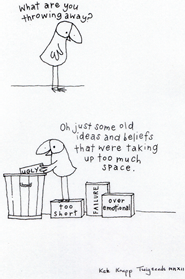Myth (An untrue belief or explanation – Collins Dictionary).
The following statements (myths) about Happiness have historically been told by western society – to be true. These thoughts drive us to aspire to be in a state of “Happiness” (all joy and fun, all peace and contentment and living happily ever after) – the Holy Grail of Life. Sometimes, maybe but not all the time would be more like it.
As we live, the realities of life confront our concepts of what happiness is and we begin to ask ourselves some very critical questions:
How will I know when I get there?
Will I ever get there?
What do I need to do to get there?
How realistic is it for me to ever achieve Happiness?
I only want to be Happy!
Doubt begins to emerge and we question ourselves when our lives are not Happy and we begin to believe the other stories our mind has been telling us that “there must be something wrong with me; everyone else is happy except me”.
So, what are these myths that appear to be embedded in our belief systems that create so much confusion, anxiety and even more unhappiness?
Myth 1:
Happiness is the natural state for all human beings.
The statistics (World Health Organisation) disprove this myth:
1 in10 adults will attempt suicide
1 in 5 will suffer from depression and or anxiety
30% of us will suffer from a psychiatric disorder (diagnosed or undiagnosed)
Add in the misery attached to: loneliness, divorce, sexual difficulties, work stress, midlife crisis, relationship issues, domestic violence, social isolation, bullying, harassment, prejudice, low self-esteem, chronic anger and lack of meaning or purpose in life; and we start to realise how rare natural state of happiness is for all human beings.
So therefore, if we don’t feel happiness consistently then this is more of a natural state of thinking for most human beings? Just a thought.
Happiness like all our feelings is fleeting – we love to have but so hard to hold.
Myth 2:
“If you’re not happy, you’re defective.
There is an assumption here that in western society, mental suffering is abnormal.
Feelings of unhappiness are sometimes seen as a weakness or illness that is faulty or defective and in some extreme cases, may certainly need clinical intervention. Living a full life of experiences will also have the full range of human emotions.
However; if we acknowledge the ACT (Acceptance and Commitment Therapy) definition of Happiness; “a rich full and meaningful life” (p.15), then we will gain far more insight in to this myth.
If you are living your life to the best you can; inevitably you will have times that are challenging and carry great weight to your well-being and possibly many parts of your life. When we take action and plan to steer our lives by what we believe in and what truly matters, then we begin to feel a powerful sense of vitality. It is this vitality that gives us the ability to push forward (make choices) to where we want to be – “a profound sense of a life well lived” (P.15).
Myth 3:
To create a better life, we must get rid of negative feelings.
This is such a strong belief in our feel-good society. We appear to be obsessed with “finding Happiness”! We are constantly advised to stop thinking negatively and only think positively, otherwise you will not BE Happy! Life is a reality trip and negative thoughts and feelings are very much of how our mind works and how we react to the world around us. Some days are diamonds and yes, some days are stone! Some days just are.
Change often comes out of having negative thoughts and feelings especially if they are persistent – that is the positive side. Noticing our negative thoughts and feelings are in fact warning signs of considering a change or accepting that these thoughts and feelings may pass at this time. Knowing what you value and what you want for your whole life; will act as guides for creating a better life. Like everything that we experience as human beings; negative thoughts and feelings do have a purpose – in time that purpose will be revealed.
Myth 4:
You should be able to control what you think and feel.
Oh, if only we really could control what we think and feel! It may be that we attempt to manage our thoughts and feelings that are uncomfortable rather than to control – which is much like flicking an “off” switch. Not that easy – to explain more.
The word should can be a very loaded word when we talk about human behaviour. It may weigh us down with a behaviour expectation that we may not necessarily want to accept. It may also add to our feelings of failure or not being strong/good enough. This is the last thing we need to feel when anxiety and/or frustration come in the way of making life choices and decisions that possibly need to be made to take action.
I’m sure you have tried many things to try and get rid/control your negative thoughts and feelings. They may lessen for a while and make you feel better temporarily. However; they will not get rid of negative thoughts and feelings over a long time. You may also have experienced if you are not too distressed, you can to some degree be who you want to be – “pull it off”. You may have also discovered that if your level of distress increases; your ability to control your feelings progressively lessens. This can also add to our feelings of personal inadequacy.
As you can see, these four Happiness Myths are very powerful in trapping us in the struggle for what we think is our Happiness. Finally, they do this as the struggle is against our own human nature, our human mind that has been developed to keep us safe when we are threatened. Therein lies a great paradox of human life.
So, perhaps dropping the struggle might lead you in the best life direction – manage instead of control to start living
Reference:
Dr Russ Harris (2007)
“The Happiness Trap – Stop Struggling Start Living”







